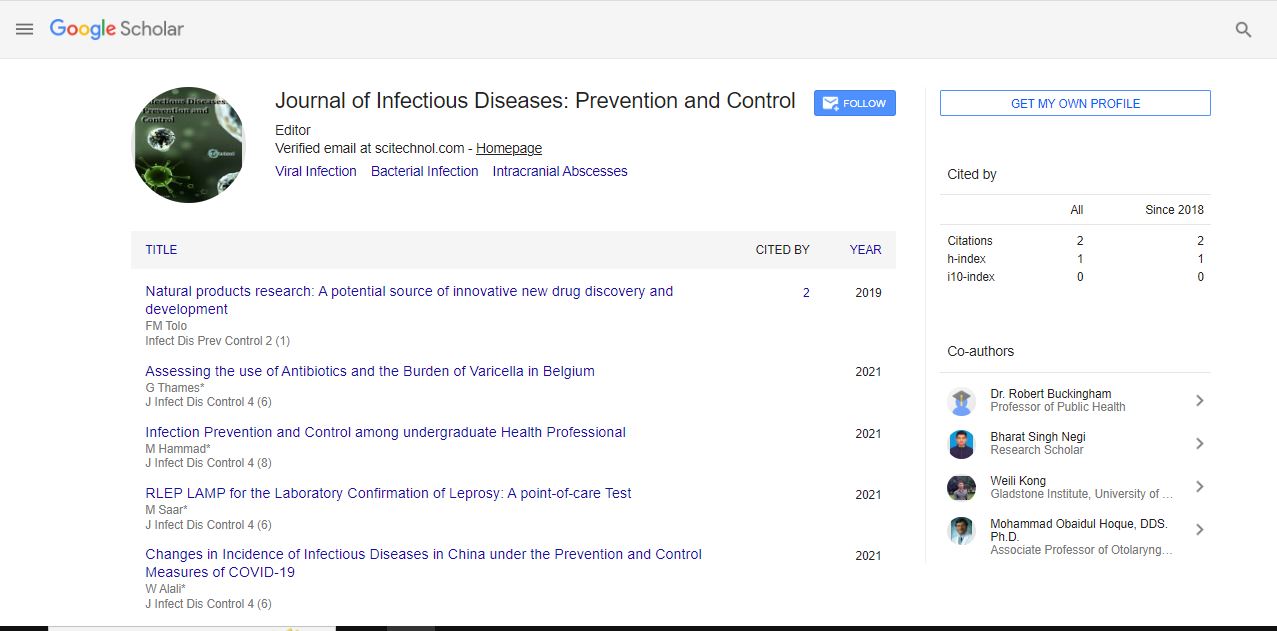Opinion Article, Infect Dis Prev Control Vol: 6 Issue: 4
Analyzing Health Trends through Epidemiology
Salerno Cordeira*
1Department of Epidemiology and Prevention, University of International Health, Tokyo, Japan
*Corresponding Author: Salerno Cordeira,
Department of Epidemiology and
Prevention, University of International Health, Tokyo, Japan
E-mail: salecord@yahoo.com
Received date: 24 November, 2023, Manuscript No. IDPC-24-127259;
Editor assigned date: 27 November, 2023, Pre QC No. IDPC-24-127259 (PQ);
Reviewed date: 11 December, 2023, QC No. IDPC-24-127259;
Revised date: 18 December, 2023, Manuscript No. IDPC-24-127259 (R);
Published date: 26 December, 2023, DOI: 10.36648/idpc.6.4.148
Citation: Cordeira S (2023) Analyzing Health Trends through Epidemiology. Infect Dis Prev Control 6:4.
Description
In global health complex patterns, epidemiology serves as an important lens through which health trends are meticulously analyzed and understood. Fundamentally, epidemiology is the study of the distribution and determinants of health-related states or events in populations. It seeks to understand not only the occurrence of diseases but also the factors influencing the patterns. Epidemiologists analyze health trends by examining the distribution of diseases, identifying risk factors and discerning patterns of occurrence over time and across different populations. Central to the practice of epidemiology is the surveillance of health events, a systematic process of collecting, analyzing, interpreting and disseminating health data. Through surveillance, epidemiologists track the frequency and distribution of diseases, enabling the identification of emerging health threats and the assessment of the effectiveness of public health interventions. Various data sources contribute to epidemiological analyses, including health records, laboratory reports, surveys and demographic data.
The integration of diverse data streams enhances the precision of health trend analyses, allowing for a comprehensive understanding of the factors influencing population health. Descriptive epidemiology forms the foundation for analyzing health trends by providing a detailed portrait of the distribution of diseases within populations. This involves characterizing who, what, where and when of health events.
Epidemiologists use tools such as tables, graphs and maps to visually represent patterns of diseases, highlighting variations across demographics, geographic locations and time periods. Epidemiology comes to the forefront during outbreaks of infectious diseases, playing a vital role in understanding transmission dynamics and guiding control measures.
Through contact tracing, outbreak investigations and modeling, epidemiologists discern how diseases spread within populations and implement strategies to interrupt transmission. This real-time analysis informs public health responses, enabling the timely implementation of measures to minimise the impact of the outbreak. In the context of chronic diseases, epidemiology reveals the complexity of conditions such as cardiovascular diseases, diabetes and cancers. Longitudinal studies help identify risk factors that contribute to the development of chronic diseases over extended periods. These inputs guide preventive measures and interventions aimed at reducing the burden of noncommunicable diseases. Epidemiology extends its reach into social determinants of health, exploring how social, economic and environmental factors contribute to health disparities. Social epidemiology delves into the root causes of health inequalities, examining how factors such as income, education and access to healthcare influence health outcomes.
Conclusion
By analyzing health trends through a social epidemiological lens, analysts can identify populations disproportionately affected by certain diseases and advocate for policies that address underlying social determinants. The ultimate goal of epidemiology is to inform public health action. Once health trends are analyzed and determinants identified, evidence-based interventions can be designed and implemented. In the ever-evolving landscape of public health, epidemiology serves as the foundation for analyzing health trends and informing interventions that safeguard population well-being. From mapping the distribution of diseases to determining the cause and understanding social determinants, epidemiology provides a dynamic framework for comprehending the complex interaction of factors influencing health. As the field continues to advance, epidemiologists will play a pivotal role in addressing emerging health challenges and working towards a future where health outcomes are optimized for all.
 Spanish
Spanish  Chinese
Chinese  Russian
Russian  German
German  French
French  Japanese
Japanese  Portuguese
Portuguese  Hindi
Hindi 